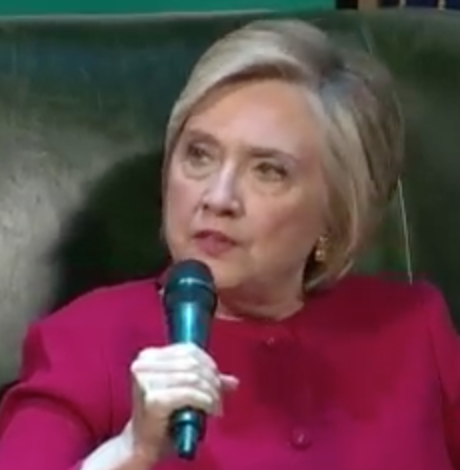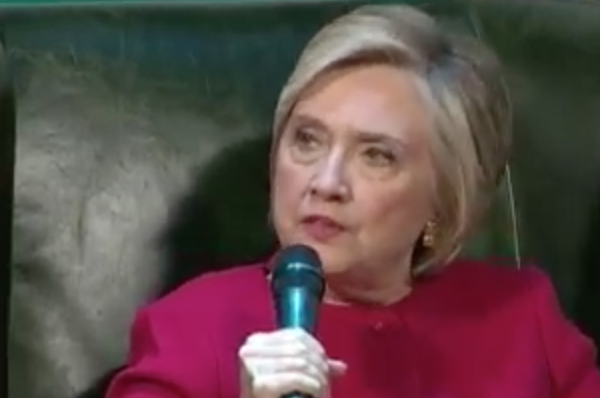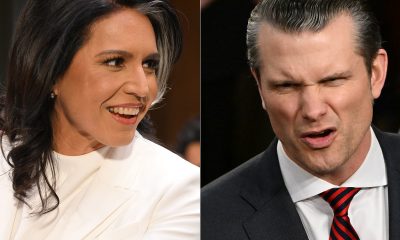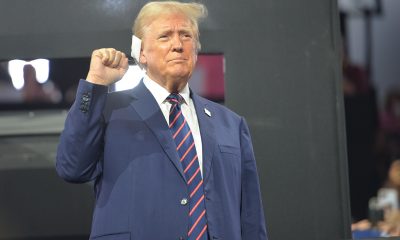Local
Clinton returns to D.C. lamenting mistakes of 2016 campaign
Dem nominee on role of misogyny, fake news in election loss


Hillary Clinton lamented having stayed “too focused on a path” in the 2016 election. (Screenshot via CSPAN)
As Hillary Clinton has reemerged in the national spotlight to promote her new book, some critics have groaned and wondered why she won’t just go away. They were not among the crowd at the Warner Theatre on Monday night.
In fact, the veneration for the first female U.S. presidential nominee of a major political party was palpable among attendees, who paid upwards of $82 for a ticket to the event.
The topic of discussion was her new book “What Happened” — a self-examination of the 2016 presidential campaign and actions that led to her loss and the election of President Trump to the White House — and Clinton had many explanations for that outcome and the way forward.
Clinton laid out a balanced approach to explain her loss, attributing the outcome not just to her missteps, but also outside forces that tipped the election in Trump’s favor.
“I just decided I was going to write it, and it was painful,” Clinton said. “I say in the book that I’d write about something, and I’d have to go lie down because it was just so hard to think about the mistakes I made and missed opportunities, but then also to come to grips with these other big forces at work that I think had a determinative impact on the outcome.”
Clinton recalled after the election before she started writing the book in February being “so devastated,” trying to feel better by cleaning out closets and taking walks in the park. The process of the writing the book, Clinton said, was “cathartic,” but also important for her view of democracy.
“It really hit me there were these very important issues that needed to be discussed, debated even, that our democracy and country relied upon that kind of self-examination,” Clinton said.
A key factor Clinton identified in her loss was not realizing the game had changed since her runs with her husband President Bill Clinton in the 1990s and her earlier campaign in 2008 — even during the 1960s and 1970s — when clear policy proposals were crucial for presidential candidates.
“You realize that the press is not putting out the policy that you’re putting out everyday, they’re covering an empty podium,” Clinton said. “And I kept thinking, ‘Well, we’re still going to break through because we really care do about what kind of jobs and infrastructure and health care and other things you want to do for them and their families and their incomes, but there’s a disconnect.”
Although Clinton said she “stayed too focused on a path” and “was not as adept” at changing to the new environment, she cautioned a less detailed approach might not be the path in the future and speculated “people will want details” again in 2020.
Lissa Muscatine, co-owner of Politics & Prose and Clinton’s chief speechwriter in the State Department and the White House, moderated the forum and queried Clinton on factors attributed to her loss, from Russian interference to fake news and misogyny.
Clinton recalled feeling compelled to exercise constraint as a woman and not respond during the second presidential debate when Trump could be seen on camera lurching close behind her as she spoke.
“As you might think back — funny gestures, facial expressions, heavy sighs — these really do affect viewers,” Clinton said. “And I just ended up believing that in addition to the gender-linked aspect of this, there was a history of people in presidential debates who had deviated in a way to show frustration, anger, dismissiveness, whatever their feelings were, and paid a heavy price for it, and I thought whatever price they paid, I would pay double or triple.”
Clinton recalled with indignation the Russians hacking the emails of her campaign chair John Podesta, which she described as being “stolen,” and given to Wikileaks — a website Clinton called “nothing more than a tool of Putin and the Kremlin.” Clinton said Trump’s associates “certainly” knew about it, citing a tweet from Roger Stone that Podesta’s time in a barrel would soon come.
Although Clinton said the emails were “anodyne,” she said they were later weaponized as fake news — in one case to potentially violent consequences as a result of the Pizzagate scandal in which Clinton was accused of running a child trafficking ring out of the basement of D.C. pizzeria. (The restaurant doesn’t even have a basement).
“Even I have to say I don’t believe it was meant to be believed to influence somebody to pick up an AR-15 and drive from North Carolina to Washington to liberate the imaginary children from the imaginary basement of the pizza parlor,” Clinton said. “But in came this young man believing that he was on a mission because he saw it on Facebook, he saw it in other places online, he saw it in quote, news outlets. And so, he was there on a mission of rescue. People could have gotten killed; he [fired] his automatic weapon inside this pizza parlor.”
Citing her loss to Trump by 53 percent among white women, Clinton said a major factor was former FBI Director James Comey reopening the email investigation — only for him to close it again one day before the election .
“All of sudden, people are told being told something’s going on, they’re going to investigate her again, or whatever,” Clinton said. “We could see that a lot of women in particular turned away. They were discouraged. I don’t blame them. They didn’t know what to believe. I mean, it was outrageous.”
When Muscatine mentioned Sen. Bernie Sanders (I-Vt.), whom Clinton heavily criticizes in her book for raising doubts about her connections to Wall Street, the audience at the Warner Theatre audibly booed and hissed.
But there were also moments of levity at the event. Muscatine at one point engaged Clinton in a game of having to choose one of a pair of words. Asked about “tea” or “coffee,” Clinton replied “coffee.” Asked about “beach” or “mountains,” Clinton replied “beach.” Asked about “Trump” or “Putin,” Clinton replied she’d have to “take that under advisement” because she “ran against both of them.”
Attendees at the event — who consisted mostly of middle-class women but also members of D.C.’s LGBT community — came to the Warner Theater adorned in Clinton campaign T-shirts leftover from the 2016 election. One vendor outside sold campaign buttons with slogans reading “Hillary 2016” and “Hil Yes!”
Blake Smith, 20, a gay student at George Washington University, worked for Clinton’s presidential campaign and came to the event wearing a T-shirt comprised of a collage of images of Clinton.
“I just think she gets a bad rap,” Smith said. “And I think that people treat her really unfairly, and I think that she’s really, genuinely a good person and she cares about this country.”
District of Columbia
Deon Jones speaks about D.C. Department of Corrections bias lawsuit settlement
Gay former corrections officer says harassment, discrimination began in 1993

Deon Jones says he is pleased with the outcome of his anti-gay bias lawsuit against the D.C. Department of Corrections that ended after five years on Feb. 5 with the D.C. government paying him $500,000 in a settlement payment.
The lawsuit, filed on his behalf by the American Civil Liberties Union of D.C. and the international law firm WilmerHale, charged that Jones, a Department of Corrections sergeant, had been subjected to years of discrimination, retaliation, and a hostile work environment because of his identity as a gay man in clear violation of the D.C. Human Rights Act.
A statement released by the ACLU at the time the settlement was announced says Jones, “faced years of verbal abuse and harassment, from co-workers and incarcerated people alike, including anti-gay slurs, threats, and degrading treatment.”
The statement adds, “The prolonged mistreatment took a severe toll on Jones’s mental health, and he experienced depression, post-traumatic-stress disorder, and 15 anxiety attacks in 2021 alone.:
Jones said the harassment and mistreatment he encountered began in 1993, one year after he first began work at the Department of Corrections and continued for more than 25 years under six D.C. mayors, including current Mayor Muriel Bowser, who he says did not respond to his repeated pleas for help.
Each of those mayors, including Bowser, have been outspoken supporters of the LGBTQ community, but Jones says they did not intervene to change what he calls the homophobic “culture” at the Department of Corrections.
The Department of Corrections, through the Office of the D.C. Attorney General, which represents city agencies against lawsuits, and the mayor’s office, have so far declined to comment on the lawsuit and the half million-dollar settlement the city offered to Jones, who accepted it.
Among other things, the settlement agreement states that Jones would be required to resign from his job at the Department of Corrections. It also declares that “neither the parties’ agreement nor the District government’s offer to settle the case shall in any way be construed as an admission by the District that it or any of its current or former employees, acted wrongfully with respect to plaintiff or any other person, or that plaintiff has any rights.”
Scott Michelman, the D.C. ACLU’s legal director said that type of disclaimer is typical for parties that agree to settle a lawsuit like this. He said the city’s action to pay Jones a half million-dollar settlement “speaks louder than words.”
With that as a backdrop, Jones reflected on the settlement and what he says was his tumultuous 30-year career as an employee at the D.C. Department of Corrections in a Feb. 9 interview with the Washington Blade.
He and Michelman pointed out that Jones was placed on paid administrative leave in April 2022, one year after his lawsuit was filed. Among his upcoming plans, Jones told the Blade, is to publish a podcast that, among other things, will highlight the hardship he faced at the Department of Corrections and advocate for LGBTQ rights.
BLADE: What are your thoughts on this lawsuit settlement which appears very much in your favor?
JONES: That’s great. I’m happy. I’m glad to resign. It’s been a long time coming. It was the worst time it’s ever been. And I have advocated for the community for many, many years. And not only standing up for my rights but for the rights for others in the LGBTQ community.
And I’m just tired now. And my podcast will start soon. And I will continue to advocate for the community.
BLADE: Can you tell a little about that and when it will begin?
JONES: Once in April, once everything is closed my podcast will be starting. And that’s Deon’s Chronicle and Reveal. Yes, my own podcast.
BLADE: Since we have reported your attorney saying you have been on administrative leave since March of 2022, some in the community might be interested in what you have been doing since that time. Did you get another job or were you just waiting for this case to be resolved?
JONES: I was waiting for this to be resolved. I couldn’t work. That would violate policy and procedures of the D.C. government. So, I could not get another job or anything else.
BLADE: You have said under administrative leave you were still getting paid. You were still able to live off of that?
JONES: Yes, I was able to. Yes, sir. I used to do a lot of overtime. As a zone lieutenant for many years, I have supervised over 250 officers. I’ve also supervised over 25,000 inmates in my 30 years.
BLADE: How many years have you been working for the Department of Corrections?
JONES: It’s 30 years all together. I started down at the Lorton facility. Six facilities — I’ve worked for past directors, deputy directors, internal affairs. I’ve done it all.
BLADE: Do you have any plans now other than doing the podcast?
JONES: Well, to just do my podcast and also to write my book and my memoir inside of the house of pain, the house of shame — what I’ve been through. When I start my podcast off it will be stories — Part 1 through Part 4. And I will go back to the Lorton days all the way up to now. When it first started was sexual harassment and discrimination back down at Lorton. And I mean this has just been the worst time around.
BLADE: So, did you first start your work at the Lorton Prison?
JONES: Yes, I was at the central facility, which was the program institution.
MICHELMAN: Just for context. You may remember this, but the Lorton facility was where D.C. incarcerated people were held. So, that was part of the D.C. Department of Corrections.
BLADE: Yes, and that was located in Lorton, Va., is that right?
JONES: Right.
BLADE: Didn’t that close and is the main incarceration facility is now in D.C. itself?
JONES: Yes. And that closed in 2001.
BLADE: I see. And is the main D.C. jail now at a site near the RFK Stadium site?
JONES: Yes, sir. And next-door is the correctional treatment facility as well.
BLADE: So, are you saying the harassment and other mistreatment against you began back when you were working at the Lorton facility?
JONES: At the Lorton central facility. And they used to flash me too. When I say flash me like the residents, the inmates were flashing. And they [the employees] were flashing.
BLADE: What do you mean by flashing?
JONES: They take their penis out and everything else. I mean the sexual harassment was terrible. And I came out then down there. And I continued to advocate for myself and to advocate for other people who I was told were being picked on as well.
BLADE: As best you can recall, where and what year did that happen?
JONES: That was back in 1993 in April of 1993.
BLADE: The mayor’s office has declined to comment on the settlement and payment the city is giving you. Yet they have always said they have a strong policy of nondiscrimination protections for LGBTQ people in D.C. government agencies. But do you think that was not carried out at the Department of Corrections?
JONES: That’s a blatant reason why — I had 13 anxiety attacks. It was so blatant. Can you imagine? On the airwaves or the walkie-talkies — everybody had a walkie talkie — the captains and the majors and everything. And you transmit it to the command center or something like that. When you finish someone gets on the air and calls you a sissy or a fag.
They received so many complaints, and I also sent the mayor so many emails and begging for help. And they ignored it. They didn’t address any complaints at all. So, that’s bull.
BLADE: But now after you filed your lawsuit and you received this settlement do you think there will be changes there to protect the rights of other LGBTQ employees?
JONES: I hope so, because I have been defending community rights. For many years I have been advocating for different things and different services. And I’ve seen the treatment. There are a lot of mistreatments towards the community over there. And I have taken a stance for a lot of people in the community and protecting their constitutional rights as well as mine.
BLADE: What advice might you have for what the Department of Corrections should do to correct the situation that led to your lawsuit?
JONES: Well, what my advice for the department is they need to go back over their training. And they need to enforce rules against any acts of discrimination, retaliation, or sexual harassment. They need to enforce that. They’re not enforcing that at all. They’re not doing it at all. And this time it was worse than ever, then I’ve ever seen it. That you would get on the walkie talkie and someone would call you a fag or a sissy or whatever else or do evil things and everything. They are not enforcing what they are preaching. They are not enforcing that.
BLADE: Is there any kind of concluding comment you may want to make?
JONES: Well, I hope that this litigation will be a wakeup call for the department. And also, that it will give someone else the motivation to stand up for their rights. I was blessed to have the ACLU and WilmerHale to protect my constitutional rights. So, I am just really happy. So, I’m hoping that others will stand up for their rights. Because a lot of people in the community that worked there, they were actually afraid. And I had some people who actually quit because of the pressure.
Baltimore
‘Heated Rivalry’ fandom exposes LGBTQ divide in Baltimore
Hit show raises questions about identity, cultural representation

By JOHN-JOHN WILLIAMS IV | “Heated Rivalry,” the surprise gay hockey romance that has captivated global audiences and become a cultural phenomenon, has inspired sold-out parties celebrating the characters from the steamy series, including in Baltimore.
For some, love of the show has exposed the loss of a once-vibrant gay nightlife in Charm City and splintered its LGBTQ community. It also brings up layered questions about identity, cultural representation, and the limits of identity politics.
In Baltimore, the majority of the parties also appear to be missing a key ingredient that has been a part of the show’s success: gay men at the helm. Last month, women hosted a dance party at Ottobar, a straight establishment.
The rest of this article can be read on the Baltimore Banner’s website.
Virginia
McPike wins special election for Va. House of Delegates
Gay Alexandria City Council member becomes 8th LGBTQ member of legislature

Gay Alexandria City Council member Kirk McPike emerged as the decisive winner in a Feb. 10 special election for a seat in the Virginia House of Delegates representing Alexandria.
McPike, a Democrat, received 81.5 percent of the vote in his race against Republican Mason Butler, according to the local publication ALX Now.
He first won election to the Alexandria Council in 2021. He will be filling the House of Delegates seat being vacated by Del. Elizabeth Bennett-Parker (D-Alexandria), who won in another Feb. 10 special election for the Virginia State Senate seat being vacated by gay Sen. Adam Ebbin (D-Alexandria).
Ebbin is resigning from his Senate next week to take a position with Virginia Gov. Abigail Spanberger’s administration.
Upon taking his 5th District seat in the House of Delegate, McPike will become the eighth out LGBTQ member of the Virginia General Assembly. Among those he will be joining is Sen. Danica Roem (D-Manassas), who became the Virginia Legislature’s first transgender member when she won election to the House of Delegates in 2017 before being elected to the Senate in 2023.
“I look forward to continuing to work to address our housing crisis, the challenge of climate change, and the damaging impacts of the Trump administration on the immigrant families, LGBTQ+ Virginians, and federal employees who call Alexandria home,” McPike said in a statement after winning the Democratic nomination for the seat in a special primary held on Jan. 20.
McPike, a longtime LGBTQ rights advocate, has served for the past 13 years as chief of staff for gay U.S. Rep. Mark Takano (D-Calif.) and has remained in that position during his tenure on the Alexandria Council. He said he will resign from that position before taking office in the House of Delegates.
-

 Health5 days ago
Health5 days agoCMS moves to expand HIV-positive organ transplants
-

 State Department4 days ago
State Department4 days agoFOIA lawsuit filed against State Department for PEPFAR records
-

 Opinions4 days ago
Opinions4 days agoTrans sports bans rooted in eugenics
-

 New York4 days ago
New York4 days agoPride flag raised at Stonewall after National Park Service took it down




















